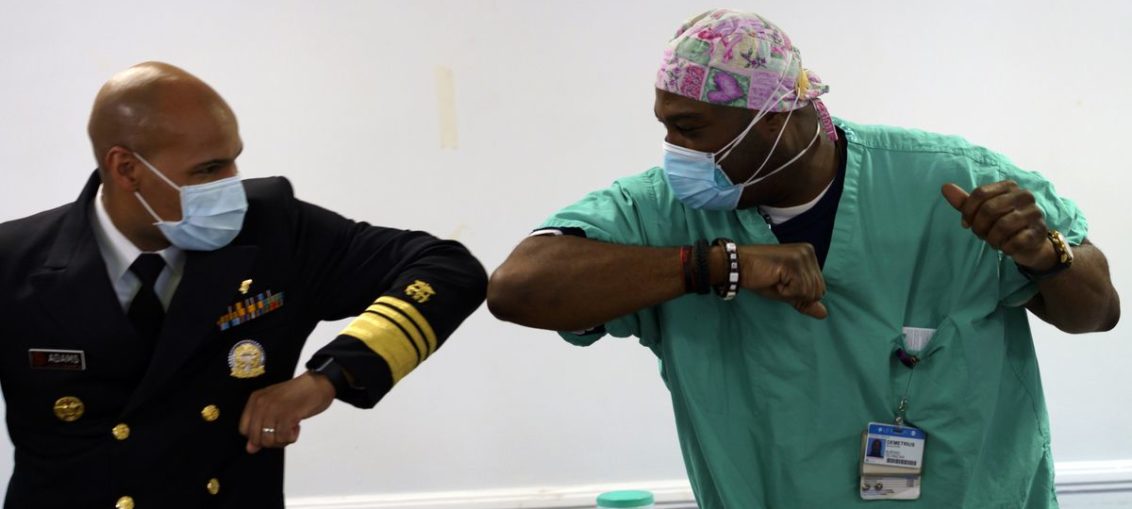
On Dec. 15, well being care staff throughout Chicago started receiving the town’s first doses of the Pfizer/BioNTech COVID-19 vaccine.
Quickly, a doubtlessly troubling trend emerged.
Within days, docs and different well being care staff from high-income, in large part white communities close to downtown and at the North Side confirmed up in huge numbers to get photographs on the hospitals the place they paintings. By Dec. 26, the best selection of vaccinations citywide have been of docs and different well being care staff from the Near North Side and in Lake View, Lincoln Park, South Loop and Wicker Park, an research via the Sun-Times’ Brett Chase discovered.
But for staff dwelling in decrease revenue and dealing magnificence neighborhoods of colour at the South and West facets, the image regarded a lot other. From Dec. 15 thru 26, the fewest vaccinations within the town have been of well being care staff from the most commonly Black Far South Side; and from West Lawn, Chicago Lawn and Belmont Cragin, neighborhoods with huge Latino populations. Both spaces have a number of the perfect COVID-19 an infection charges within the town.
The research is a stark reminder of the additional effort that will likely be wanted to make sure excessive charges of vaccination for communities of colour.
Chicago and Illinois can’t beat again COVID-19 and finish the pandemic until vaccination turns into the guideline, now not the exception, in each phase in our town.
Indeed, each Chicagoan who’s able and keen to be vaccinated — beginning with front-line staff — has a job to play in finding out one of the crucial science at the back of vaccines and, in flip, persuading reluctant friends and family to get their photographs.
As Dr. Marina Del Rios, the director of social emergency medication at University of Illinois Health and the primary Chicagoan to be vaccinated, instructed the Sun-Times: “There’s a lot of mistrust that has to be addressed even among people in the health care field.”
We’re hoping that town officers are confirmed proper within the coming weeks, once they expect that the numbers will turn out to be extra equitable.
On Monday, well being care staff at Esperanza Health Center, which serves the Latino group at the Southwest Side, become the primary Chicagoans to obtain the Moderna vaccine. Public rollouts like that may be an impressive public data software, professionals have stated.
“We’re following up now with all 35 of our hospitals to say ‘How much of your staff have you gotten through?’” Public Health Commissioner Dr. Allison Arwady stated Monday. “We’re working on an individual level with each hospital to make sure that we’re not just talking about doctors and nurses, that we’re talking about the whole range of health care professionals who work in that hospital setting.”
Outreach to the group
But no person can lose sight of the arduous and vital paintings nonetheless to come back. That’s very true for Black Americans. They are on the perfect possibility of critical sickness or loss of life from COVID-19 but, in keeping with polls, are persistently extra reluctant than whites or Latinos to take a coronavirus vaccine.
The revel in of Black well being care staff — be they docs, nurses, lab technicians, janitors or cafeteria staffers — could make a large distinction in persuading skeptics.
And doubtlessly, saving their lives.
Chicago and Illinois have their very own vaccine distribution plans. Chicago’s features a technique to pair well being care staff who’ve been vaccinated with native leaders to lend a hand construct agree with locally as an entire.
Meanwhile, Illinois is amongst the ones states that experience a big Black inhabitants however no transparent, explicit technique for vaccine outreach to Black citizens, a ProfessionalPublica investigation has discovered. The state plans to paintings with group leaders, urging them to get vaccinated publicly and to give an explanation for why they agree with the vaccine, a spokesperson tells us.
There’s no time to waste, as David Hodge, affiliate director of schooling at Tuskegee University’s National Center for Bioethics in Research and Health Care, issues out to ProfessionalPublica. He’s urging…